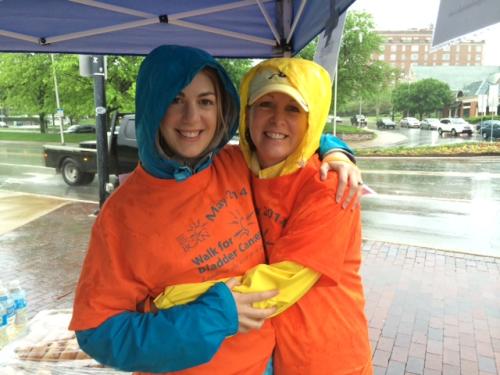
The odds should have been in Mary Beth Ballard’s favor. After all, bladder cancer is three times as likely to occur in men, and the average age at the time of diagnosis is 73. And yet there she was in February 2014—a woman in her late 20s with no family history of cancer—getting the unthinkable news at her doctor’s office.
“When it was confirmed as bladder cancer, the doctor was as shocked as I was,” says Ballard, MEd’11, a marketing manager at Second Harvest Food Bank of Middle Tennessee. “I didn’t fit the profile at all.”
Ballard first knew something was wrong when she noticed blood in her urine a few months earlier. She was not in any pain, though, so her initial reaction was to ignore the symptoms and hope the problem took care of itself. At worst she thought it was a urinary tract infection.
“I didn’t think anything of it at first,” she says. “At the time I was busy house-hunting and doing other things. [rquote]Life was happening, and I didn’t pay too much attention to it.”[/rquote]
When the symptoms did not go away, Ballard scheduled an appointment with a urologist, who performed a biopsy after detecting tumors in her bladder. Following her diagnosis, she sought a second opinion with a urologic oncologist in Vanderbilt’s Department of Urologic Surgery, where she eventually chose to move her care. That decision would prove to be life-changing in more ways than one.
Under the care of Dr. Sam Chang, MD’92, the Patricia and Rodes Hart Professor of Urologic Surgery, she had additional growths removed from her bladder and then began a six-month regimen of immunotherapy. This past October, Ballard finally was deemed cancer-free.
“I really had excellent care at Vanderbilt,” she says. “I had great interactions with the doctors, the nurses, even the receptionist—everybody. Things like that count when you’re in that situation.”
At the time of her treatment, Ballard was not just a patient at Vanderbilt but an employee as well. After earning her master’s in higher education administration from Peabody College, she worked in Development and Alumni Relations for several years, first with the Senior Class Fund and then in Planned Giving.
Her work colleagues, she says, not only provided a network of support for her during those difficult times but also turned her onto the Osher Center for Integrative Medicine at Vanderbilt, where she learned more about yoga, nutrition and breathwork. Those resources helped her become more mindful in her approach to life.
“From an emotional and relationships standpoint, there’s a lot of good that’s come from this,” Ballard says. “[lquote]I’m more grateful and living to enjoy the day.[/lquote] I used to be way more focused on the future, but going through this has helped me take a step back and appreciate the moment more.”
Her experience has given her a new mission in life as well: to raise awareness about bladder cancer however she can. She is a member of the Vanderbilt-Ingram Cancer Center Young Ambassadors, a group of young professionals with a shared interest in fighting cancer. She also is actively involved in the Bladder Cancer Advocacy Network (BCAN), an organization that promotes and funds research programs and provides critical patient support and education services.
Ballard currently is organizing BCAN’s inaugural Walk for Bladder Cancer in Nashville, which will take place May 3 at Sevier Park and will feature several Vanderbilt teams. Then later in May, she will travel with BCAN representatives to Washington, D.C., to talk to legislators about increasing bladder cancer research funding.
“This walk and the opportunity to go to D.C. are things I never would have imagined,” she says. “I want to share my story because, had I known bladder cancer was a possibility, I would have gone to the doctor sooner. [rquote]If I can help bring attention to this disease, especially for younger people and women, then I’ll consider all of this a success.”[/rquote]
To find out more about upcoming BCAN walks planned in cities across the country, visit walkforbladdercancer.org.